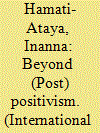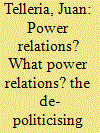| Srl | Item |
| 1 |
ID:
117521


|
|
|
|
|
| Publication |
2012.
|
| Summary/Abstract |
This paper explores Pragmatism's potential for transcending the antagonism between positivism and post-positivism, through the work of Morton Kaplan, who combines a Pragmatist theory of knowledge with a systems theory of world politics. A reconstruction of Kaplan's synoptic philosophy shows how Pragmatism can help us move beyond the dual fallacy of truth as correspondence and truth as self-consciousness, to a non-foundationalist epistemology that acknowledges the historicity of knowing without annihilating the realism of the common world we live in. Moving from the realm of knowledge to the realm of judgment, this paper also reconstructs Kaplan's moral analysis, thereby revealing its significance for the discipline's renewed concern for the problems of values and reflexivity.
|
|
|
|
|
|
|
|
|
|
|
|
|
|
|
|
| 2 |
ID:
154482


|
|
|
|
|
| Summary/Abstract |
The UN′s Sustainable Development Goals agenda points far into 2030, which shows that its post-war development endeavour is not functioning effectively. This article implements a discourse analysis of the UN Development Programme′s (UNDP) Human Development Reports (HDR) and exposes their internal contradictions. This analysis enables a critical reflection on the UNDP′s political position: its reports conceal the political causes of underdevelopment. By concealing the antagonistic/conflictual dimension of social issues – poverty, inequality, and exclusion – the UNDP naturalises the actual neoliberal order. The HDR turns political problems into technical issues; according to this approach, no power relations have to be changed in order to overcome underdevelopment.
|
|
|
|
|
|
|
|
|
|
|
|
|
|
|
|
| 3 |
ID:
141141


|
|
|
|
|
| Summary/Abstract |
Many contemporary conflicts are framed as antagonistic and difficult to resolve because of their zero-sum framing among the disputants. This article addresses the antagonism–agonism nexus and the political and contested nature of building peace. It has a three-fold aim: (1) to critically assess the interplay between constructive and destructive dynamics; (2) to analyse the circumstances under which conflict may move from antagonism to agonism; and (3) to advance the novel notion of agonistic peacebuilding. The Middle East Peace process is used as a critical case of intractable conflict to elucidate the enabling and restraining conditions for agonistic peacebuilding.
|
|
|
|
|
|
|
|
|
|
|
|
|
|
|
|
| 4 |
ID:
126064


|
|
|
|
|
| Publication |
2013.
|
| Summary/Abstract |
Contemporary Western war-fighting is animated by the fictitious imagination of a war free from antagonism. In this logic, winning wars is about winning the 'hearts and minds' of local populations, about persuasion rather than confrontation. In recent years, the concept of 'strategic communication' (SC) has been elevated to the top echelons of strategic thinking in United States military circles, focusing attention on how to communicate 'effectively' with local populations. Via an analysis of the concept of SC, this article examines the ethico-political dimensions of contemporary Western-led 'population-centric' war. Through a reading inspired by Judith Butler's recent work in Precarious life (London: Verso 2006) and Frames of war (London: Verso 2009), and an analysis that turns on the link between ethics and ontology, I reflect on the significance of the 'communications turn' in warfare for our study of war in ontological terms.
|
|
|
|
|
|
|
|
|
|
|
|
|
|
|
|